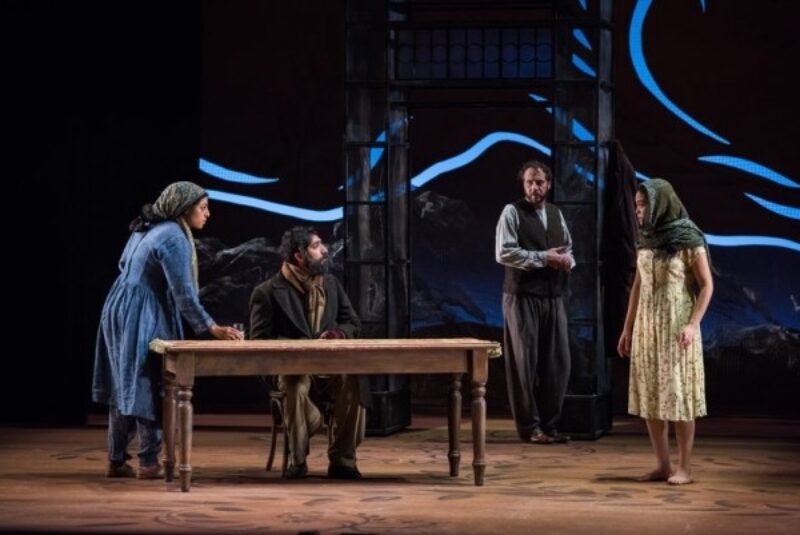Seeing the Sunrise Starts with Survival
Written by Jaiden B, during TeenTix’s arts criticism training workshop, the Fall 2018 Press Corps Intensive.

The opening scene in the theatrical adaptation of A Thousand Splendid Suns, by Ursula Rani Sarma, contrasts the entire play with the eerie stillness it sets the audience in. By piercing the quiet atmosphere with sharp, lingering notes, this scene stills the air and makes the audience pause for breath. From the next scene onwards, the audience is kept in silence not by the moving musical accompaniment, but by the paralyzing horror with which the play unfolds. The first scene wraps around the audience with the unnervingly gentle, yet strong, sound of David Coulter’s original score performed live. As he is slowly pulled across the stage on a lengthy sheet of fabric, we are introduced to the sole man who effectively ties novel instruments—including a violin, thunder sheets, and even a saw—to the emotional landscape that the characters traverse.
We first meet one of the main characters, Laila (a role that is passionately performed by Rinabeth Apostol), with her father (performed thoughtfully by John Farrage) as they read poetry together. This innocent scene does nothing to prepare the audience for the further torment Laila will endure. For the time being though, it beautifully shows the deep connection between the father, Babi, and his daughter. Their connection contrasts the future of ruins with the perfect present, and its perfection hints at a greater danger to come. As the two characters read poems of Kabul, they not only sing the praises of their beautiful city but intertwine their love with profound anguish. Their pain stems from the loss of their city, the very place they hold dear, due to the dangers of a war-torn country that forces them to leave.

Rinabeth Apostol as Laila and Denmo Ibrahim as Mariam in A Thousand Splendid Suns at Seattle Repertory Theatre. Photo by Nate Watters.
We learn that Laila knows loss well as her two older brothers were killed when she was young. However, if Laila thinks she understands irreversible sorrow from losing her brothers to their courage, her mother to grief, and her homeland to war, then she cannot begin to comprehend the greater suffering she is to undergo.
As the play progressed and more horrors were added to Laila’s sorrows, though, it was I who struggled to comprehend the sum of her troubles. Whether it was my unwillingness to understand what unfolding before my eyes, or the pure shock of reality, I resisted the truth that was set before me. Eventually, the play forced me to accept that this was a reality for many through its painfully stunning portrayal of Laila and Mariam’s interconnected lives.
As we see Laila hastily married to a husband, Rasheed (played by Haysam Kadri), with an unwelcoming wife, Mariam (played by Denmo Ibrahim), after the bombing of Laila’s own home and the death of her parents, things only go downhill from there. It is through Mariam, the husband’s older, first wife, and Laila’s struggles that we see the determination and perseverance that helps them survive and overcome their hardships. The terrible difficulties the two women face, alone, against each other, and finally as companions, ultimately provide the chance for the audience to see the beautiful journey the two take towards liberation.
This review was written as part of the Fall 2018 Press Corps Intensive. It was edited by teaching artist and critic Becs Richards.
The TeenTix Press Corps promotes critical thinking, communication, and information literacy through criticism and journalism practice for teens. For more information about other Press Corps programs including the Teen Editorial Staff or the TeenTix Newsroom, see HERE.


